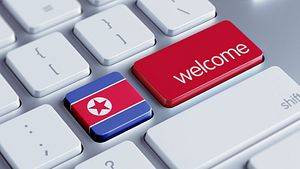North Korea has only a few thousand internet users in a country of 25 million. To enjoy this exclusive privilege, a North Korean must first successfully apply for a permit from the government to own a computer and a second permit to access the internet with it. In contrast, more than 90 percent of the people in South Korea, one of the world’s most wired countries, are netizens.
While living in North Korea, I witnessed many changes, some quite dramatic by North Korean standards, including the emergence of the internet, and more significantly, its own version, namely a steadily expanding intranet.
For internet users, North Korea’s telecom at first offered a slow dial-up connection to a web server hosted in a Chinese province bordering North Korea. As a resident foreigner, I didn’t need a permit and had unrestricted access to any website. The restrictions were technological, not political. Emails with larges attachments were costly as their transfer often took minutes rather than seconds, and at that time email use would cost several dollars a minute. Later I used the internet through access set up by a German business man. An American satellite link enabled access from North Korea’s telecom to his web server in Germany. Thanks to his much lower prices I saved several thousand dollars a month. To the satisfaction of its users, the evolving internet became faster and cheaper over the years.
In parallel, North Korea developed its “Kwangmyong” which means literally “bright” or “light.” This free, domestic-only network or intranet opened in 2000. It offers a Firefox-style browser called “Our Country” with which users can navigate more than 5,000 websites at present. It is a large library, a place to propagate information, and a communication platform between government agencies, universities, industry, and commerce. It has many pages copied from the World Wide Web and includes flight and train schedules, weather forecasts, and news sites. Many of North Korea’s three million mobile phone users are using their devices to surf this intranet.
Intranet content is strictly subject to government approval; as it says, it wants to “let the breeze from the internet in while shutting out the mosquitoes.” Its Facebook-like pages, chat rooms, and emails are closely monitored. It also has been difficult for the North Korean engineers of the first-foreign invested software company I co-founded to work on projects online with clients abroad, as is common practice in the software industry. This turned out to be an important competitive disadvantage for us.
The intranet is also used for commercial purposes and entertainment. When I was CEO of a pharmaceutical company, we were among the first to set up a commercial domestic website. It helped us a lot to build our brand and competitive services and to communicate with the medical profession across the country while also selling and distributing our pharmaceuticals and other healthcare products to remote provinces.
Pyongyang’s critics claim the regime is afraid of giving its population access to the larger internet, as it would undermine its authority. They may be right. They may also be ignoring the fact that North Koreans know much more about the outside world than the outside world knows about them: North Korea has less than 3.000 Western visitors a year, but many more North Koreans flock to China every year. China issues up to 40,000 work visas for North Koreans per year. Unsurprisingly South Korean soap operas and some Hollywood films, which are wildly popular, find their way across the porous Chinese border into the so-called Hermit Kingdom and North Korea’s youngsters, reportedly, even watch porn movies.
Therefore the threat from the inflow of information may be less real than the regime and its foes believe. But even if North Korea allowed all its citizens unrestricted access to the internet, their access would remain heavily censored and limited — by the United States, no less. As I’ve noted previously:
Under the conditions of international sanctions imposed by the U.S. Treasury Department’s Office of Foreign Assets Control … all major tech companies such as Google (NASDAQ:GOOG), Yahoo (NASDAQ:YHOO), Microsoft (NASDAQ:MSFT) and Oracle (NASDAQ:ORCL) among others, also restrict access to their products from sanctioned countries.
LinkedIn blocked my North Korea-based account in compliance with the U.S. Treasury Department’s directive. I couldn’t use my credit card in North Korea either but I was one of the few who could and did use Google and Facebook as these companies seemed to have ignored U.S. sanctions law.
When I lived in Vietnam in the mid-nineties very few people had access to the Internet, then also perceived as highly risky by the government. By mid-1998 there were an estimated 1,500 customers, or approximately 4,000 individual internet users, in Vietnam (population in 1998: 76 million). In this respect it was exactly the same as when I arrived in North Korea some years later.
But, unlike in North Korea, some significant geopolitical events would soon help change Vietnam’s landscape: On February 3, 1994, President Bill Clinton lifted the U.S. trade embargo. On July 11, 1995, Clinton announced the normalization of U.S.-Vietnam relations, and soon thereafter a U.S. embassy was set up in Hanoi.
As a consequence, the fear of opening up and letting more people have access to a hitherto “hostile” internet with its many infectious “Western mosquitoes” diminished over the years.
As of 2015, some 20 years later, Vietnam has more than 44 million internet users (44 percent of the population), including 30 million Facebook users.
If the United States were to end the Korean War, sign a peace treaty and normalize its relations with the “Hermit Kingdom,” it is quite likely North Korea could also count at least 44 percent of its population — if not much more — as internet users in 20 years’ time.
Felix Abt is a serial entrepreneur who has lived and worked in nine countries on three continents. He is the author of the book A Capitalist in North Korea: My Seven Years in the Hermit Kingdom.

































